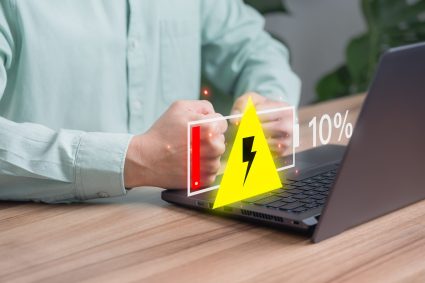
When it comes to buying a laptop, the most important question is how long it will last. This can vary depending on a number of factors, such as the hardware quality, the brand and model, how the laptop is used and maintained, and even environmental factors. Knowing how long a laptop should last is an important factor in making a buying decision.
Content of the page
If you are interested in Dell laftops, check our article on Dell Laptops Lifespan, or if you prefer Lenovo, we have an article on that too: lifespan of Lenovo laptops.
Factors Affecting the Lifespan of Laptops
Hardware Quality
The hardware of a laptop is one of the most important factors in determining its lifespan. Generally, laptops with higher quality components will last longer than those with cheaper components. Higher quality components are more reliable, meaning there is less chance of them failing. Additionally, higher quality components are usually more energy efficient, which means they will require less maintenance and use less energy.
Brand and Model
The brand and model of the laptop can also affect its lifespan. Different brands and models of laptops are designed differently, and some are built with higher quality components than others. Additionally, some brands and models are known for their reliability and durability, while others may be less reliable and more prone to failure. It is important to research the brand and model of the laptop before buying it, to make sure it is a good investment.
Usage and Maintenance
How a laptop is used and maintained can also affect its lifespan. If a laptop is used heavily, it may wear out faster than if it is used only occasionally. Additionally, if the laptop is not properly maintained, it may suffer from more mechanical failures and other issues. Proper maintenance includes cleaning the laptop regularly, updating the software, and keeping the laptop free of dust and debris.
Environmental Factors
Environmental factors can also affect the lifespan of a laptop. If the laptop is kept in an environment with excessive heat or cold, it can cause hardware components to fail, as well as other issues. Additionally, keeping the laptop in an area with a lot of dust or smoke can clog up the fan and cause it to overheat. It is important to keep the laptop in an environment that is free of dust and other airborne particles.
Software Updates and Upgrades
Software updates and upgrades can also affect the lifespan of a laptop. Updating the laptop’s software regularly can help keep it secure from viruses and other malicious software. Additionally, upgrading the laptop’s hardware components, such as the processor or RAM, can help improve its performance and extend its lifespan.
Signs of a Failing Laptop
Knowing the signs of a failing laptop can help you identify potential problems before they become serious. If your laptop is exhibiting any of the following symptoms, it may be time to consider replacing it.
Slow Performance
If your laptop is running slower than usual, it may be a sign that it is failing. This can be caused by a number of factors, such as low memory or a virus. If your laptop is running slowly, it is important to diagnose the issue and take steps to address it.
Crashes and Blue Screens of Death
If your laptop crashes or displays a blue screen of death, it may be a sign that there is a serious hardware or software issue. This is especially true if the crashes happen frequently or without warning. If this is the case, it is important to diagnose the issue and take steps to address it.
Overheating
If your laptop is overheating, it is a sign that the cooling fan or other components are failing. This can cause serious damage to the laptop, so it is important to address the issue as soon as possible. If the laptop is overheating, it is important to clean the cooling fan and check for other hardware issues.
Battery Life and Charging Issues
If your laptop is not holding a charge or is not lasting as long as it used to, it may be a sign that the battery is failing. This can be caused by overcharging or using the laptop for extended periods of time. If the battery is not lasting as long as it used to, it is important to consider replacing it.
Hardware Failures and Errors
If your laptop is displaying hardware errors or fails to detect certain hardware components, it may be a sign that the laptop is failing. This can be caused by hardware components that are failing or not being properly detected by the laptop. If this is the case, it is important to diagnose the issue and take steps to address it.
How to Extend the Life of Your Laptop
When you invest in a laptop, you want it to last as long as possible. Fortunately, there are a few simple steps you can take to ensure your device remains in good condition and lasts for an extended period of time. Regular cleaning and maintenance, proper storage and handling, optimizing settings and removing bloatware, upgrading hardware and components, and investing in quality accessories are all key to extending the lifespan of your laptop.

Regular Cleaning and Maintenance
Regularly cleaning and maintaining your laptop is essential for ensuring its longevity. Dust and debris can accumulate inside your laptop and cause the fan to work less efficiently, leading to overheating and shortening the life of your device. Additionally, cleaning your laptop’s keyboard can help prevent sticky keys and other common issues. You should also check for any loose screws or connections and make sure that all the ports and plugs are securely connected.
Proper Storage and Handling
Storing and handling your laptop properly can help extend its lifespan. You should always avoid dropping or banging your laptop, as this can cause physical damage that can reduce its longevity. Additionally, you should store your laptop in an area with minimal temperature fluctuations, as extreme temperatures can damage the internal components. Investing in a reliable laptop bag or case is also a good idea, as this will help protect your device from bumps and scratches.
Optimizing Settings and Removing Bloatware
Optimizing your laptop’s settings and removing bloatware can help improve its performance and extend its lifespan. Bloatware is software installed on your laptop that you don’t need or use, and it can take up valuable storage space and processing power. To maximize the performance of your laptop, you should remove any unnecessary software and optimize the settings for your specific needs. This will also help reduce the strain on your device and improve its lifespan.
Upgrading Hardware and Components
Upgrading your laptop’s hardware and components can help extend its lifespan. You may want to upgrade your RAM, storage, or graphics card to give your laptop a boost in performance. In addition, if any of the components in your laptop are outdated or no longer functioning correctly, you should consider replacing them to ensure your laptop runs smoothly and reliably.
Investing in Quality Accessories
Investing in quality accessories can help extend the life of your laptop. Quality accessories may include a laptop cooler, a laptop stand, or a protective case. Additionally, investing in a reliable laptop charger can help ensure your device stays powered up and running smoothly. Taking these steps can help keep your laptop running optimally and extend its lifespan.
When to Replace Your Laptop
Even with proper maintenance and care, at some point you may need to replace your laptop. There are several factors to consider when deciding when it’s time to invest in a new device. If your laptop is running on obsolete technology, is incompatible with new software, or you’re spending too much on repairs and maintenance, it’s likely time for an upgrade.
Obsolete Technology
If your laptop is running on outdated technology, it may be time to consider replacing it. Older laptops may not be able to keep up with newer software or hardware, making them less efficient and reliable. Additionally, outdated technology can reduce the performance of your laptop, making it difficult to use for everyday tasks.
Incompatibility with New Software
If your laptop is incompatible with new software, it may be time to invest in a new device. With advances in technology, new software is released regularly, and if your laptop is unable to support the new software, you may need to upgrade your device. Additionally, if the software you need to use requires more power than your laptop can provide, you may need to invest in a new device.
Costs of Repairs and Maintenance
If you’re spending more on repairs and maintenance than what a new laptop would cost, it’s likely time for an upgrade. Although investing in repairs and maintenance can help extend the life of your laptop, at some point it may become more cost effective to invest in a new device. Additionally, if your laptop is constantly needing repairs, it may be a sign that it’s time to upgrade.
Physical Damage and Wear and Tear
If your laptop has suffered physical damage or is showing signs of wear and tear, it may be time to replace it. Physical damage can weaken the internal components of your laptop and reduce its performance, making it difficult to use for everyday tasks. Additionally, if you notice that your laptop is slowing down or taking longer to boot up, it may be a sign that it’s time to invest in a new device.
Conclusion
Summary of Factors Affecting Laptop Lifespan
Extending the lifespan of your laptop is possible with regular maintenance and care. Cleaning and maintaining your laptop, storing it properly, optimizing settings and removing bloatware, upgrading hardware and components, and investing in quality accessories can all help extend its life. Additionally, investing in a new laptop may be necessary if your device is running on obsolete technology, is incompatible with new software, or you’re spending too much on repairs and maintenance.
Importance of Proper Usage and Maintenance
Taking the proper steps to maintain and care for your laptop can help extend its lifespan. Regular cleaning, proper storage and handling, optimizing settings and removing bloatware, upgrading hardware and components, and investing in quality accessories can all help keep your laptop running optimally and ensure it lasts as long as possible.
When to Consider Buying a New Laptop
If your laptop is running on outdated technology, is incompatible with new software, or you’re spending too much on repairs and maintenance, it’s likely time for an upgrade. Additionally, if your laptop has suffered physical damage or is showing signs of wear and tear, it may be time to replace it. Investing in a new laptop can help ensure you have a reliable and efficient device for everyday tasks.

